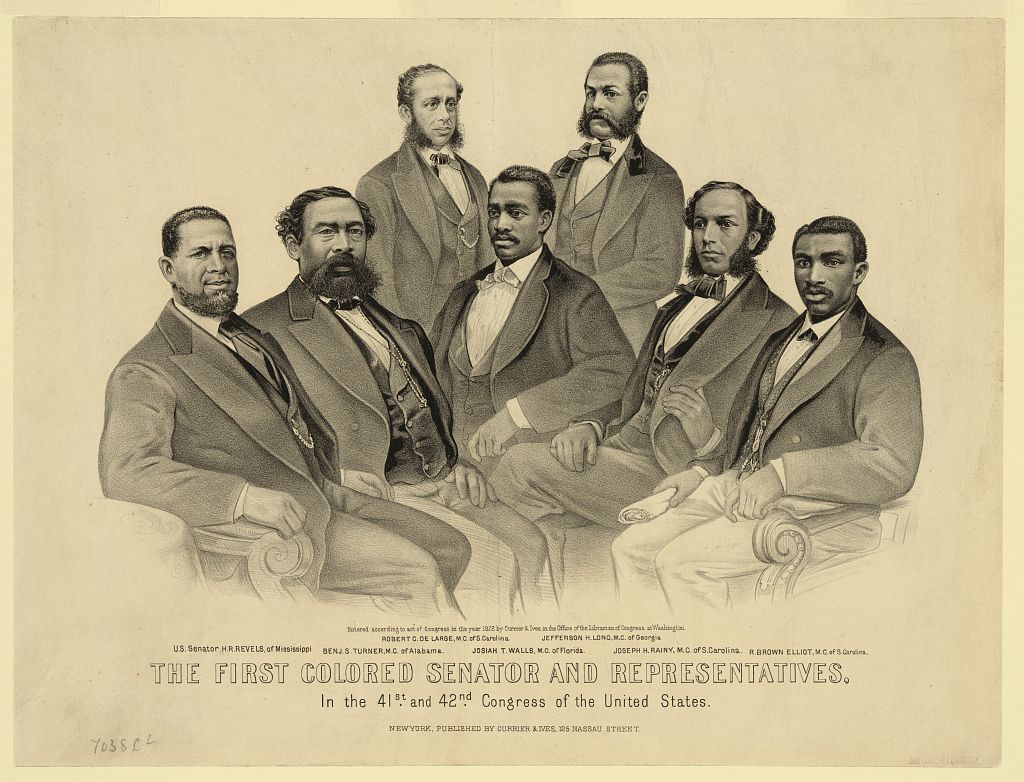Blacks Excluded from Politics

In 1890, a constitutional convention in Mississippi effectively excluded Blacks from voting. The convention adopted a series of requirements that included literacy, "understanding," and also excluding voters who had been convicted of all forms of crimes, minor or other.
The Mississippi Constitution of 1890 emerged from a period of intense political and social pressure in the post-Reconstruction era. For 15 years following Reconstruction, Mississippi had maintained an uneasy truce between multiple political parties and races. While intimidation and threats of violence were common, white leaders tolerated some level of political participation from African Americans, including split-ticket voting and holding lower-level offices in counties with large Black populations.
However, challenging economic times led to a shift in allegiances, with some white farmers collaborating with African Americans. This alarmed white elites, sometimes provoking violent responses. Concerns about federal interference and the potential "corruption of morals" among younger generations prompted state leaders to consider rewriting the constitution.
The primary aim of the new constitution, as widely understood by the public, was to legally disenfranchise African Americans. Senator J.Z. George led the convention, but real power resided in the large franchise committee, which included prominent state leaders and one African American delegate, Isaiah Montgomery.
Recognizing that the Fifteenth Amendment prohibited outright bans on African American voting, the convention expanded voting requirements. The new constitution mandated that voters be male, at least 21 years old, and residents of the state for two years and within a county for one. It also introduced an annual poll tax of two dollars and required voters to swear they had not committed certain felonies, which were deemed more likely to have been committed by African Americans.
The constitution implemented several key mechanisms to disenfranchise African Americans:
- Poll Taxes: These fees disproportionately affected poor African Americans and whites.
- Literacy Tests: Potential voters had to demonstrate an ability to read and understand the state constitution, a subjective requirement often administered unfairly.
- Understanding Clause: As an alternative to the literacy test, registrants had to explain a section of the state constitution, allowing for subjective and biased judgments by registrars.
- Residency Requirements: These were designed to prevent sharecroppers, who frequently moved, from voting.
- State-printed ballots: This requirement necessitated literacy, further limiting African American participation.
The "understanding clause" proved particularly controversial, nearly derailing the convention. Many Mississippians wrote to newspapers, pointing out its potential for manipulation. Despite the controversy, the clause remained in the constitution.
The convention also addressed other issues that exposed class divides within the state. Careful negotiations were required to balance the interests of Black and white counties. Some proposals, like prohibiting convict leasing, found wide support. Others, such as education reform and judicial appointments, revealed deep divisions. The convention used gerrymandered reapportionment to balance power in the legislature.
Recognizing the potential unpopularity of these compromises, the convention decided to enact the constitution by proclamation rather than through a ratification process.
The new constitution faced challenges both in the U.S. Senate and in the courts. Senators George and Walthall defended it against attacks during debates on the national Elections Bill. In the legal arena, the U.S. Supreme Court's decision in Williams v. Mississippi (1898) upheld the constitution's provisions. Williams, an African American convicted of murder, argued that the constitution's voting restrictions effectively excluded African Americans from jury pools. The Court ruled that Williams had not proved the constitution harmed African Americans on its face, allowing Mississippi and other Southern states to control African American voting rights.
The impact of the 1890 constitution was immediate and dramatic. The number of registered Black voters plummeted from over 190,000 in 1890 to less than 9,000 by 1892. This disenfranchisement paved the way for the entrenchment of Jim Crow laws and the establishment of a one-party system dominated by white Democrats, which persisted well into the 20th century.
Unlike some Southern states that relied on additional measures like grandfather clauses, the Mississippi constitution's restrictive provisions withstood legal challenges until the Twenty-Fourth Amendment in 1964. The constitution set a precedent for similar actions in other Southern states, significantly impacting civil rights and the socio-political landscape of the United States.
 >
>